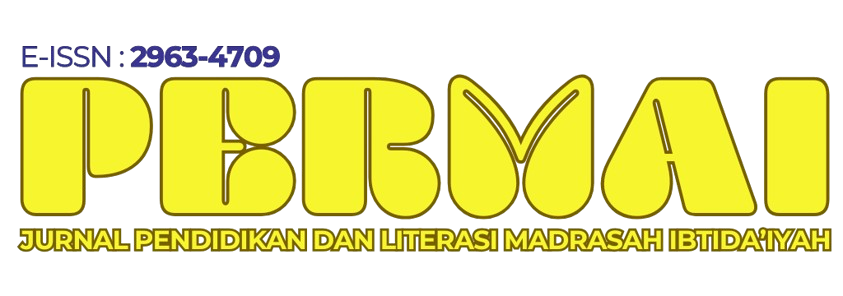Pendekatan Kognitif Sosial Pada Pembelajaran Pendidikan Agama Islam dan Implikasinya di SD Alam Auliya Kendal (Perspektif Albert Bandura)
DOI:
https://doi.org/10.63889/permai.v4i1.280Keywords:
Kognitif-Sosial, Albert Bandura, PAIAbstract
Bandura's social cognitive approach suggests that behavior is an accumulation of past experiences in success or failure, social persuasion from the social environment, emotional state, and the experience of seeing models. This research explores the application of this approach in learning Islamic religious education at SD Alam Auliya Kendal, where teachers act as role models who motivate students. Through descriptive methods, data were obtained from literature and field observations, focusing on four modeling processes: attention, storage, behavior formation, and motivation. The results showed that the application of social cognitive theory can increase students' participation and understanding of religious teachings, as well as contribute to the formation of good character. The way teachers carry out religious education learning requires modeling or exemplification in the environment to stimulate students. In this study, the authors collected data by identifying thoughts or findings in books, papers, journals, articles related to the topic. Discussing by using descriptive methods to explain the main ideas related to the discussion problem. The application of Bandura's social cognitive theory to Islamic Religious Education learning is very appropriate. In Islam, the highest role model is the Prophet Muhammad SAW, a role model and role model for Muslims.
Keywords: Social-Cognitive, Albert Bandura, PAI.
Abstrak
Pendekatan kognitif sosial Bandura mengemukakan bahwa perilaku merupakan akumulasi dari pengalaman masa lalu dalam keberhasilan atau kegagalan, persuasi sosial dari lingkungan sosial, keadaan emosional, dan pengalaman melihat model. Penelitian ini mengeksplorasi penerapan pendekatan ini dalam pembelajaran pendidikan agama Islam di SD Alam Auliya Kendal, di mana guru berperan sebagai teladan yang memotivasi siswa. Melalui metode deskriptif, data diperoleh dari literatur dan observasi lapangan, dengan fokus pada empat proses pemodelan: perhatian, penyimpanan, pembentukan perilaku, dan motivasi. Hasil penelitian menunjukkan bahwa penerapan teori kognitif sosial dapat meningkatkan partisipasi dan pemahaman siswa terhadap ajaran agama, serta berkontribusi pada pembentukan karakter yang baik.Cara guru melaksanakan pembelajaran pendidikan agama memerlukan keteladanan atau keteladanan di lingkungan untuk merangsang siswa. Dalam penelitian ini, penulis mengumpulkan data dengan mengidentifikasi pemikiran atau temuan dalam buku, makalah, jurnal, artikel yang terkait dengan topik. Berdiskusi dengan menggunakan metode
deskriptif untuk menjelaskan gagasan pokok yang berkaitan dengan masalah pembahasan. Penerapan teori kognitif sosial dari Bandura ke dalam pembelajaran Pendidikan Agama Islam sangat sesuai. Dalam Islam, suri tauladan tertinggi adalah Nabi Muhammad SAW, suri tauladan dan panutan bagi umat Islam.
Kata Kunci: Kognitif-Sosial, Albert Bandura, PAI.
References
A B Halim Tamuri, Mohamad Khairul, and A. A. (2010). Amalan Pengajaran Guru Pendidikan Islam Berkesan Berteraskan Konsep Mu ‘ Allim. Journal of Islamic and Arabic Education.
Abu Ahmadi. (2004). Psikologi Belajar. Rineka Cipta. Alwisol. (2006). Psikologi Kepribadian. UMM Press.
Aprida Pane and Muhammad Darwis Dasopang. (2017). Belajar Dan Pembelajaran. Fitrah:Jurnal Kajian Ilmu-Ilmu Keislaman.
D. A Nurhidayah. (2015). Pengaruh Motivasi Berprestasi Dan Gaya Belajar Terhadap Prestasi Belajar Siswa Pada Mata Pelajaran Matematika SMP. Jurnal Dimensi: Pendidikan Dan Pembelajaran.
Dale. H. Schunk. (2012). Learning theoris. An education perspektif. edisi ke enam. Pustaka Pelajar.
Eko Bayu Gumilar, & Kristina Gita Permatasari. (2024). Application of Games-Based Mathematics Learning in the Preschool-Elementary Transition. Journal of Insan Mulia Education, 2(1), 1–9. https://doi.org/10.59923/joinme.v2i1.78
Elga Yanuardianto. (2019). TEORI KOGNITIF SOSIAL ALBERT BANDURA, Studi Kritis dalam
Menjawab Problem Pembelajaran di MI. Jurnal Auladuna, Vol. 1, No.
Gumilar, E. B., Mukhlasin, A., Permatasari, K. G., Utami, Y., Nahdlatul, U., & Cilacap, U. A. (n.d.). REINFORCING THE TRANSITION FROM EARLY CHILDHOOD EDUCATION. 126–138.
Isneini, Ermawati ; Eko Bayu, G. (2022). PENGEMBANGAN MEDIA PEMBELAJARAN BERBASIS HUMAN COMPUTER INTERACTION (HCI) UNTUK MENINGKATKAN MOTIVASI BELAJAR SISWA SD MUHAMMADIYAH. Jurnal PERMAI, 1(1). http://www.jurnal.staimuhblora.ac.id/index.php/permai/article/view/129
Indra Cakti, dkk. (2017). BUKU BUNGA RAMPAI (Kumpulan Karya Dosen Seluruh Indonesia Bidang Ilmu-ilmu Sosial dan Ilmu-ilmu Eksakta Tahun 2017). CV. IRDH.
Janet Lesilolo. (2018). PENERAPAN TEORI BELAJAR SOSIAL ALBERT BANDURA DALAM PROSES BELAJAR MENGAJAR DI SEKOLAH. KENOSIS, vol.4.
Luhur Wicaksono. (2015). Keefektivan Pemodelan Terhadap Peningkatan Efikasi-Diri Akademik Siswa Smp (Kajian Teoritik Aplikasi Teori Bandura). Jurnal Visi Ilmu Pendidikan (J-VIP).
Nelly Marhayati. (2020). Pendekatan Kognitif Sosial pada Pembelajaran Pendidikan Agama Islam.
DAYAH: Journal of Islamic Education, Vol. 3, No.
Risma, F. (2014). Buku Pembelajaran Psikologi Belajar. UIN SUNAN AMPEL.
Santy Handayani. (2016). Pengaruh Perhatian Orangtua Dan Minat Belajar. Formatif : Jurnal Ilmiah Pendidikan MIPA.
Tarsono. (2010). Implikasi Teori Belajar Sosial (Social Learning Theory) Dari Albert Bandura Dalam Bimbingan Dan Konseling. Psympathic. Jurnal Ilmiah Psikologi, III,.
Tri Andjarwati. (2015). Motivasi Dari Sudut Pandang Teori Hirarki Kebutuhan Maslow, Teori Dua Faktor Herzberg, Teori Xy Mc Gregor, Dan Teori Motivasi Prestasi Mc Clelland. Jurnal Ilmu Ekonomi Dan Manajemen.
Suwoko;, Setiaji, B., Waston;, Maulana, H. K., Muthoifin;, & Gumilar, E. B. (2024). FAMILY EDUCATION TO IMPROVE THE QUALITY OF HUMAN RESOURCES AND SUSTAINABLE DEVELOPMENT IN SAMARINDA 1 INTRODUCTION Education is one of the key factors in the formation of quality human resources . However , education is not only limited to the school envi. 1–19. https://rgsa.openaccesspublications.org/rgsa/article/view/5716
Downloads
Published
How to Cite
Issue
Section
License
Copyright (c) 2025 Nehru Millat Ahmad, Hithna Rohadatul Aisyi, Hisyam Naufan Maulana

This work is licensed under a Creative Commons Attribution 4.0 International License.




.jpg)

